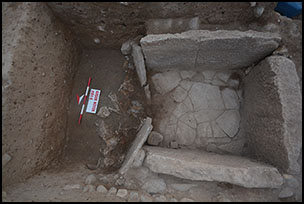Article contents
Radical ‘royals’? Burial practices at Başur Höyük and the emergence of early states in Mesopotamia
Published online by Cambridge University Press: 27 June 2018
Abstract

Human sacrifice has long been associated with the rise of hierarchical centralised societies. Recent excavation of a large cist tomb at third-millennium BC Başur Höyük, in Turkey, shows that state formation in Mesopotamia was accompanied by a fundamental change in the value of human life within local ritual economy. Osteological analysis and study of the grave goods have identified some of the dead as human sacrifices. This was indeed a retainer burial, reflecting the emergence of stratified society at a time of instability and crisis.
- Type
- Research
- Information
- Copyright
- Copyright © Antiquity Publications Ltd, 2018
References
- 4
- Cited by


